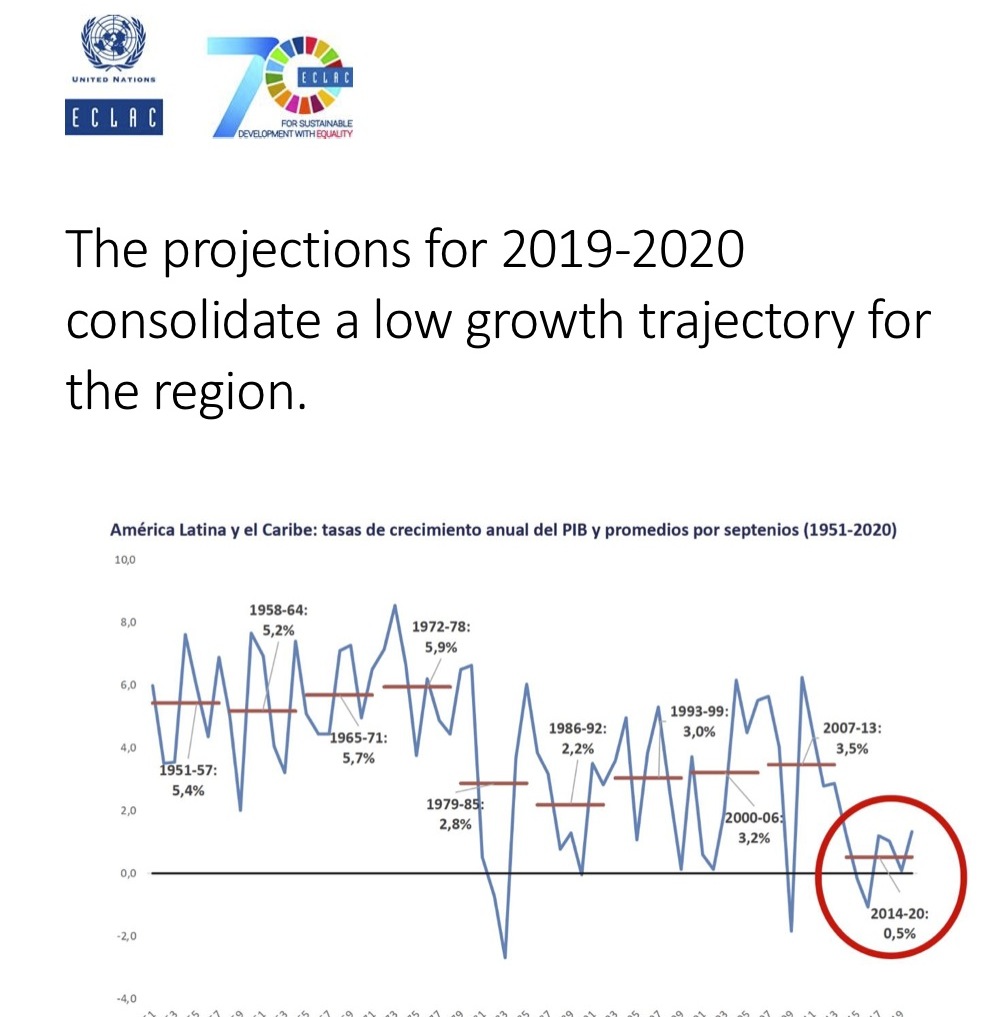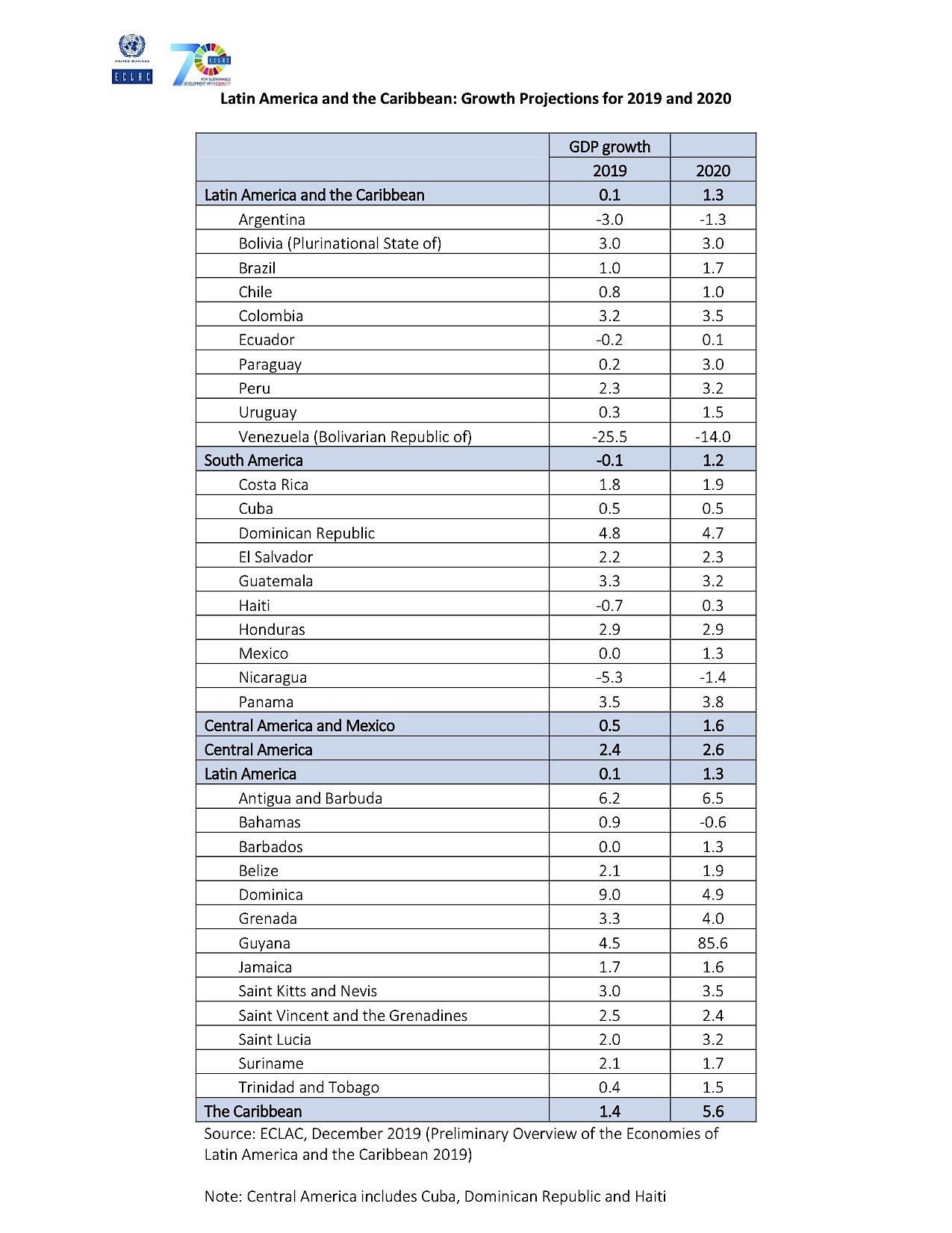Presentation Summary ECLAC launches the Preliminary Overview of the Caribbean 2019

At the launch of the Preliminary Overview of Latin America and the Caribbean, Sheldon McLean, the Coordinator of Economic Development Unit of ECLAC, Port of Spain, reviewed the macroeconomic performance of the Caribbean economies in 2019 and outlined projections for 2020.
Economic growth was subdued in 2019 across most Caribbean economies due to the impact of fiscal austerity measures in some countries and lack of investor confidence. The weighted average real growth in the region remained unchanged at 1.4% in 2019 relative to 2018. Among the goods-producing economies, GDP growth is expected to be 1.2% in 2019 (up from 0.8% in 2018), while the service-producing economies declined marginally to 1.7% (down from 1.8% in 2018). There were, however, some strong growth increases as growth strengthened in the hurricane ravaged economies of Dominica and Antigua and Barbuda as reconstruction efforts intensified, foreign direct investments strengthened and the tourism industry recovered with public sector investment support. The three fastest growing economies for 2019 were Dominica (9.0%), Anguilla (6.3%) and Antigua and Barbuda (6.2%).
This marginal growth trend is expected to continue into 2020 for most Caribbean economies but will be heavily driven up by skyrocketing growth of 85.6% forecasted for the Guyanese economy as commercial oil production by ExxonMobil is carded to begin in December 2019. The forecasted weighted average real growth across the Caribbean region is 5.5% in 2020. However, with the exclusion of Guyana, the weighted average real growth falls to 1.5%. The forecasted average rate of growth among the goods-producing economies in 2020 is 10.4% but plummets to 1.6% when Guyana is excluded. Growth in the Trinidad and Tobago economy is also expected to improve to 1.5% (up from 0.4% in 2019) supported by new natural gas projects and an increased implementation of public sector investment programmes ahead of the general election.
Alternatively, growth among service-producing economies will decline to 1.4% in 2020 relative to 1.7% in 2019 as Bahamas bears the economic impact of the passage of hurricane Dorian and the reconstruction momentum across the Dominica’s economy slows. However, the economies of the Organization of the Eastern Caribbean States (OECS) will continue to post strong growth of 4.1% led by Antigua and Barbuda (6.5%), Grenada (4.0%) and Saint Kitts and Nevis (3.5%), which is above the global growth rate of 3.4%. More specifically, strong investments, especially foreign direct investment, supported by public sector investment projects, are expected to continue to drive growth, increase employment and consumption in Antigua and Barbuda. Downside risks to the 2020 forecast include an active hurricane season, continued uncertainty around commodity prices, lingering trade tensions, and Brexit.
Despite efforts to restore healthy public finances, there was slippage in 2019 with the fiscal deficit worsening from 1.2% of GDP in 2018 to 2.2% of GDP in 2019 owing to relatively large increases in the deficit in a small number of countries that offset fiscal consolidation. Generally, the deficit was higher in the goods-based economies (4.0% of GDP) than in their service-based counterparts (1.5% of GDP). With an average debt-to-GDP ratio of 67.9% in 2019, at its lowest point since 2010, Caribbean economies moved closer toward the debt sustainability benchmark of 60%, a 2.6 percentage points decline relative to 2018.
The Caribbean continues to grapple with hurricanes and climate change related disasters. In 2019, the islands of Abaco and Grand Bahama were devastated by the passage of hurricane Dorian at an estimated total cost (damage, losses and additional costs) of US$2.5 billion. The social sector bore the brunt of the damage at an estimated US$1.6 billion with Abaco bearing over 85% of the impact. The mainstay tourism sector in the two islands was severely impacted to the tune of US$855 million. The Bahamas needs to frontload investment in risk reduction and resilience to reduce the impact of future disasters.
ECLAC continues to engage member States that are threatened by these environmental threats, as well as economic threats such as unsustainable debt burdens and lack of concessional finance. Technical assistance has also been provided to encourage Economic restructuring and industrialization. By providing this support, member States will be better positioned to achieve the SDG agenda.







